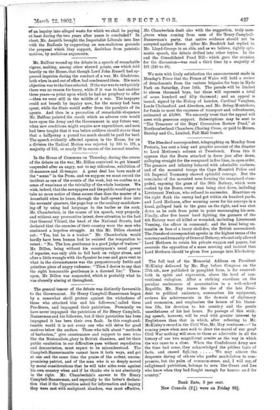The general tenour of the debate was distinctly favourable to
the Government. Sir Henry Campbell-Bannerman began by a somewhat shrill protest against the wickedness of those who attacked him and his followers,', called them Pro-Boers, and impugned their patriotism. Personally we have never impugned the patriotism of Sir Henry Campbell- Bannerman and his followers, but if their patriotism has been impugned it has been their own fault. In this rough-and- tumble world it is not every one who will delve for good motives below the surface. Those who talk about " methods of barbarism," give countenance and support to men who, like the Nationalists, glory in British disasters, and let their public exultation in our difficulties pass without repudiation and denunciation, must expect to be misunderstood. The Campbell.Bannermanite cannot have it both ways, and get at one and the same time the praise of the ardent, uncom- promising patriot, and of the man who is so deeply moved by moral considerations that he will take aides even against his own country when and if he thinks she is not absolutely in the right. Mr. Chamberlain's answer to Sir Henry Campbell-Bannerman, and especially to the latter's declara- tion that if the Opposition asked for information and inquiry they were met with malignant slanders, was most effective.
Mr. Chamberlain dealt also with the suggestion, truly mon- strous when coming from men of Sir Henry Campbell- Bannerman's party, that native evidence should not be accepted 'against Boers. After Mr. Brodrick had replied to Mr. Lloyd-George in an able, and as we believe, rightly opti- mistic speech, the debate drifted into other topics. In the end the Consolidated Fund Bill— which gave the occasion for the discussion—was read a third time by a majority of 191 (240 to 49).










































 Previous page
Previous page